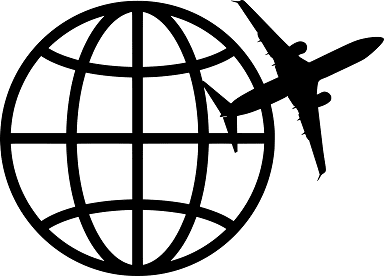From the outside, it might look like nonstop glamour and endless opportunities to travel for free. In fact, it can be very hard work, yet because so many people are interested in it, not every company offers the best pay or work conditions. However, if you find the right niche, this can be a terrific industry if you’re a people person and you want to see the world.
Choosing Your Field
Examples of careers in this area include working in hospitality, travel sales, or becoming a travel marketing professional. The education that you need varies a great deal. A high school diploma may be sufficient if you want to be a flight attendant, but you may need a bachelor’s degree in marketing in order to work in that area. Although you don’t need a bachelor’s to get most jobs in hotels and similar positions, it can be helpful to get a degree or take some classes in hospitality and leisure.
It can be helpful if you are able to speak a second or a third or fourth language as well. While those who grew up bilingual will be at an advantage, you can study and bring yourself up to a good level of fluency. One thing to think about as you consider what path to pursue is what you want to be doing on a day-to-day basis. Marketing or designing itineraries for groups or individuals involves a very different set of tasks than working as a flight attendant or on a cruise ship.
In addition to the customer service elements, the latter two involve being responsible for passengers’ health and safety. Another thing to think about is your long-term plans. Flight attendants may work for decades, gaining in seniority and getting more choice assignments, but people tend to do cruise ship work for the shorter term because the hours tend to be so demanding and the pay low.
Global Fleet Management
When people think about working in this industry, they often think about careers working for the airlines or cruise ships or perhaps as a tour guide. However, another option is to look for careers that are adjacent to this industry. This might include more conventional careers that simply involve a great deal of travel or that allow you to be transferred overseas. These may be jobs you can move into from a career path outside of travel.
An example of one type of career in this vein is global fleet management, which you may be able to enter from a background in fleet management. However, there are a number of challenges you may face as well. You may need to adapt to new safety risks in countries that have a higher rate of vehicle accidents than you are accustomed to. There are GPS solutions that can help you with this, allowing you to get real-time data about your fleet and address inefficiencies as well.
However, it is important to note that driving norms in general may differ in other countries. Culture shock relating to workplace norms may be an issue as well. Americans may find that while they are used to employees who will work outside of office hours to deal with problems that arise, this is discouraged in some other countries. These kinds of issues make for unique challenges for anyone who is moving into this area from domestic fleet management, but it can be an interesting way to enter the international travel arena.
Skills and Tips
You may be involved in helping people get from one place to another, often in stressful situations. Alternately, if your job is something like working at a five-star hotel, you’ll be helping people from all over the world, some of whom will have very high expectations for service. Therefore, you need to not just be a people person but someone who genuinely likes to help people and doesn’t lose their cool easily.
You need to be aware of travel scams and have great problem-solving skills and the ability to think outside the box. You should be flexible, adaptable and open to many different types of people and ways of doing things. You should be detail-oriented, organized and have a good memory, all things that will come in handy when you have repeat customers or you’re trying to remember multiple drink orders on a large plane. If you do go to college, try to take the opportunity to study or do an internship abroad. A few months living in another culture can teach you more than half a dozen courses on a similar topic.
WHAT TO TAKE AWAY FROM THIS ARTICLE:
- A high school diploma may be sufficient if you want to be a flight attendant, but you may need a bachelor’s degree in marketing in order to work in that area.
- Although you don’t need a bachelor’s to get most jobs in hotels and similar positions, it can be helpful to get a degree or take some classes in hospitality and leisure.
- An example of one type of career in this vein is global fleet management, which you may be able to enter from a background in fleet management.























